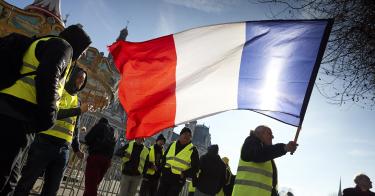The Yellow Vest protests, which began late last year in rural areas, have spread throughout the country. They are now the most violent demonstrations central Paris has seen since 1968. And despite many concessions by the French government, there is no sign that the protesters will stand down any time soon.
The social, economic and political turmoil gives Moscow's operatives fertile fields in which to sow instability. Hybrid tactics work the best where people perceive poor governance, a lack of economic freedom and opportunity, and growing distrust between law enforcement agencies and the average citizen.
France today checks all three boxes to varying degrees.
President Emanuel Macron's popularity stands at an abysmal 27%. The economy is growing at but a snail's pace, and the European Commission's latest Economic Sentiment Indicator report suggests France is on the verge of falling into recession.
Meanwhile, the escalating violence at the protests has further strained France's traditionally problematic relationship between the people and the police.
The Kremlin is already moving to take advantage of the situation, sowing even more discord and mistrust between the average Frenchman and the ruling elite.
The German Marshall Fund's Alliance for Securing Democracy, which tracks malign Russian social media influence in western democracies, estimates that more than 600 Russian Twitter accounts were using hashtags to push the protests in France. French Foreign Minister Jean-Yves Le Drian recently announced the launch of an investigation into Russian meddling on French social media.
Another hybrid tactic — using sleazy business practices to advance the Kremlin's interests — is also in evidence. Alexandre Benalla was President Macron's personal security adviser until video footage of him fighting with protesters went viral last year. He was sacked for that, but has since been accused of taking nearly €300,000 from Russian multi-billionaire Iskander Makhmudov.
Makhmudov who with business partner Andrei Bokarev used to own the Kalashnikov arms company, is widely suspected of having links to organized crime. More importantly, he was named in the U.S. Treasury's January 2018 list of oligarchs closely tied to Vladimir Putin.
The Kremlin has a long tradition of having its crony capitalists use cash to buy influence close to the heart of Western political establishments. The tangled web of Makhmudov and Benalla is the latest example.
And then there is the troublesome ideological and financial connection between Putin and Marine Le Pen, leader of France's far right National Rally party (formally known as the National Front). Le Pen's positions often mirror those of the Kremlin — whether it's calling Syrian President Bashar al Assad "the most reassuring solution for France" or backing the Russian takeover and occupation of Crimea.
During the most recent French presidential elections Le Pen met with Putin in Moscow, a curious thing to do at a time when France had joined other European countries to slap economic sanctions on Russia. Meanwhile, her party is still trying to pay off a loan worth $12.2 million from a small — and now defunct — Russian bank.
Considering her party's literal indebtedness to Russia, Le Pen's pro-Kremlin positions should come as no surprise. The scariest aspect is that she made it to the run-off vote in France's last presidential elections, and the National Rally is leading in French opinion polls ahead of May's European elections.
Although Russia is savvy enough to take advantage of the situation, Moscow has not created these problems for France. Failed economic and social policies coming from Brussels and Paris over the years have.
Ultimately, France's best way out of this mess is to restore stability and opportunity through good governance, economic freedom, and responsible police behavior.
Meanwhile, Macron can count on Russia to continue exploiting the turmoil in France to discredit his government and deepen the divides in French society. It all helps Russia achieve its wider goal of disrupting the political institutions of the West.
This piece originally appeared in Investors Business Daily



